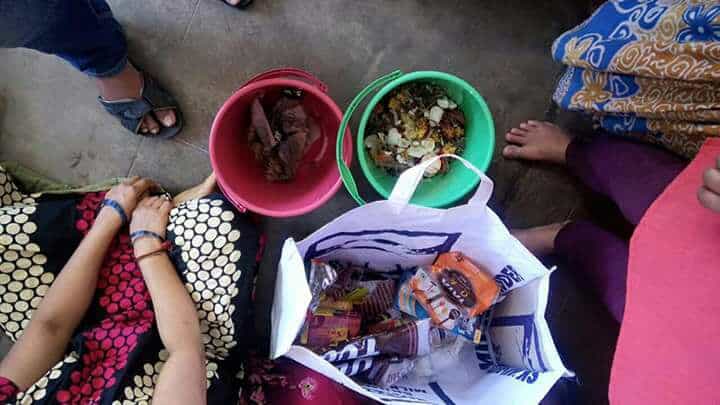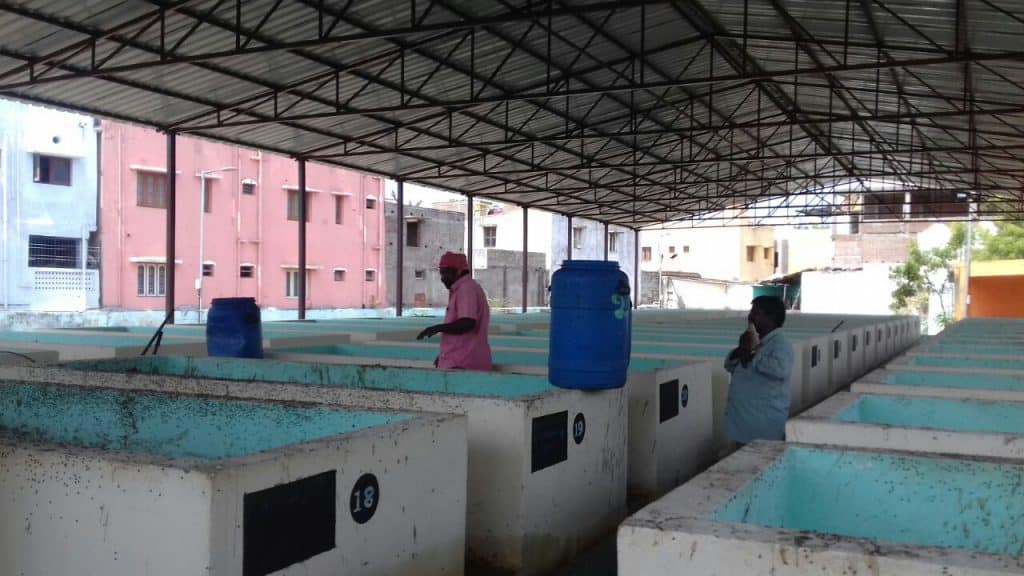Tiruvottiyur and Padur, two localities in north and south Chennai respectively, with very different socio-cultural identities, are bound by one thing in common today, something they can truly take pride in. Both these localities have been able to adhere to and implement the Solid Waste Management Rules, 2016 to a large extent.
Private kitchens with neatly displayed posters guiding residents on how to segregate waste into biodegradable, recyclable and reject waste; like-minded enthusiasts campaigning on segregation, and conservancy workers meticulously insisting on segregated waste — such sights and action are common in Tiruvottiyur and Padur, thanks to the willingness of the people and the determination of non-profit organisations.
Women in the lead
Labourers and people of diverse backgrounds belonging to the lower middle class constitute the dominant demographic group in Tiruvottiyur (Zone 1). The settlement has an equal mix of individual and small-sized apartments. Citizens from the four wards (ward 4 to ward 7) here have made it a routine to segregate waste, thanks largely to the inspiration from Exnora Green Pammal, led by Mangalam Balasubramanian. Of the 10,000 households, 2300 are segregating waste at source, thus reducing the massive load on landfills.
“Earlier, a household used to generate around 2 kg of mixed waste every day, which was dumped in landfills. Source segregation is a game changer, as only reject waste such as sanitary napkins and medicine strips, barely 100 grams per day, goes to the landfills. Wet waste is processed at the composting yards at Tiruvottiyur, whereas plastics are sent to recycling units,” Mangalam Balasubramanian explained.
A lot of hard work and motivation lies behind this achievement, as women from Self Help Groups (SHGs) and resident welfare associations have been campaigning for segregation at source for over a year. Segregation, which is yet to be practically implemented on a significant scale in other parts of the city, has been successful at Tiruvottiyur, only through consistent and sustained knowledge-sharing sessions.
“Initially, residents were so hostile that they wouldn’t let us in at their houses. To break the ice, we conducted street corner meetings that gradually won us their trust. We could eventually go into their kitchens and teach them how to segregate waste,” said Elavarasi, one of the active campaigners, adding that it took more than four months to start seeing positive results.
The Tiruvottiyur model not only reduces the burden on our overflowing landfills, but also helps workers skip segregation. Mangalam Balasubramanian’s vision is to enable citizens to process their own waste and realise the true ideals of a sustainable and circular economy. Waste generators can sell the manure or biogas that can be generated by processing wet waste.
The Padur story
Located on Old Mahabalipuram Road, Padur residents are predominantly the educated middle class, who work as software employees in the city’s IT firms. Four large apartment blocks, with over a 1000 households, have embarked on a mission to segregate waste at source – they had a trial run through the months of May and June, and launched in July.
So, how did the spark of change come about at Padur that has traditionally dumped its waste on the banks of the Buckingham canal?
An organisation called Waste Winn approached the apartment owners with a comprehensive plan of waste management. Unlike Tiruvottiyur, a majority of the population were convinced by the idea, within a span of a month. Thus volunteers took charge, talking to citizens, spreading awareness about the need for segregation and dispelling common myths.
“Working women tried to get out of it citing lack of time, while senior citizens were not open to the idea in essence. However, to my surprise, children were most enthusiastic and participated actively in creating awareness. This worked out well, as elders don’t like to be bad role models for their children,” says I Priyadarshini of Wastewinn Operators. According to Priyadarshini, 85 per cent of the population from the four apartments (1250 households) complied with the rules.
“Polluting Buckingham canal will come back to hurt all of us, in the form of mosquito menace in the immediate future. We formulated a protocol and explained the advantages of waste segregation to the residents. The dedication of housekeeping staff in ensuring segregation at source should be appreciated,” said Anuradha Nair, Vice President, Mantri Synergy Owners association. More than two tonnes of waste a day, generated by these apartments, is now processed at the Medavakkam composting yard.
The journey has not been smooth – not all are convinced and old habits die hard. “Now and then, residents go back to their usual practice of mixing waste. That’s when campaigning plays a role in educating them about the real significance of waste management,” said a volunteer.
The patience and success of these two citizen communities could pave the way for other localities in the city to take up waste management, starting right from private residences. That would reduce the work load of conservancy workers and ease the task of clearing our overloaded landfills.



if you go to a bank and find cheque drop box it shows put out station cheque here, local cheque here, this bank cheque here. when i am searching to drop cheque one of the bank officer informed me don’t worry where ever you put all the cheque will fell only one box and it has to be segregated again manually. likewise when you go to mount road post office there are three kinds of boxes for local, state and other state but all are collected and put it into one bag only. likewise the system of garbage collection is not going well. it has to be changed right from the kitchen of every house. i hope it will change slowly.